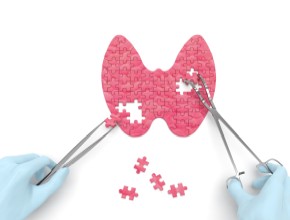References
Dhillon-Smith RK, Middleton LJ, Sunner KK, et al. Levothyroxine in Women with Thyroid Peroxidase Antibodies before Conception. N Engl J Med. 2019 Apr 4;380(14):1316-1325. doi: 10.1056/NEJMoa1812537. Epub 2019 Mar 23. PubMed PMID: 30907987.Roman Jaeschke, MD, MSc: Good morning, welcome to another edition of McMaster Perspective. Today I would like to introduce to you Doctor Serena Gundy, who is our expert in all conditions and diseases surrounding pregnancy. Serena, there is something new about thyroid status in pregnancy. Could you expand? The field is yours.
Serena Gundy, MD: Thank you very much. Some new evidence has come out in the context of women with recurrent miscarriages and infertility, particularly looking at the association of thyroid peroxidase (TPO) antibody positivity. Miscarriage is obviously a very common complication for women who conceive, occurring in almost 1 out of 5 pregnancies. It can be very devastating for both women and their partners, particularly when it is reoccurring.
The data has been mixed in the last years, looking at the association of these antibodies in infertile women or women who have adverse reproductive outcomes, but there has been an association with these consequences in women with TPO antibody positivity even in the absence of thyroid dysfunction.
This has led a lot of fertility specialists and endocrinologists to consider testing their women for TPO antibody positivity and even if they are euthyroid to consider the addition of levothyroxine supplementation in those with a history of recurrent pregnancy loss. This is a sentiment that is reflected even in the most recent American Thyroid Association (ATA) thyroid guidelines from 2017.
This study in particular set out to look at this question in further detail. It was recently published in the New England Journal of Medicine. It was a multicenter, double-blinded, placebo-controlled trial. The authors screened about 19,000 women with a history of either miscarriage or infertility and then tested them for their TPO status and thyroid-stimulating hormone (TSH) level. About 1000 of those patients were assessed for eligibility and eventually around 900 were randomized to 50 micrograms daily of levothyroxine or placebo started before conception until the end of pregnancy. What they were looking for were rates of miscarriage as well as the outcome of live birth after 34 weeks’ gestation.
Roman Jaeschke: 50 micrograms of levothyroxine, and all those women were euthyroid with normal TSH.
Serena Gundy: That is correct. Overall in that particular population they found there was no difference in the attainment of pregnancy and live-birth rate, and there were no differences in pregnancy outcomes, either obstetric or neonatal.
Roman Jaeschke: The other issue is, if I understand correctly, that there were no differences in the outcomes they looked at, which was achieving pregnancy and successful pregnancy.
Serena Gundy: There were no differences. The rates were similar, around 50% to 60% in the attainment of pregnancy and the live-birth rate was around 37% in both arms.
Roman Jaeschke: Any practical implications for the care of women in or before pregnancy?
Serena Gundy: I think this study—and this is a specific population looking at women who have had recurrent miscarriage or infertility prior to conception or at the start in an attempt to optimize the conditions for pregnancy—in these women who are also euthyroid, regardless of their TPO antibody positivity, there is no sense from this study that the addition of levothyroxine is going to help them reduce the risk of miscarriage or improve the rates of live birth. Perhaps there are other alternative medications or things that fertility physicians and endocrinologists can do, but it does not look like levothyroxine in euthyroid women will prevent these risks.
Roman Jaeschke: Thank you very much. I think it will be of some use to our listeners. We will come back to you with more pregnancy-related questions. Thank you very much.
Serena Gundy: Thank you very much.
 English
English
 Español
Español
 українська
українська











